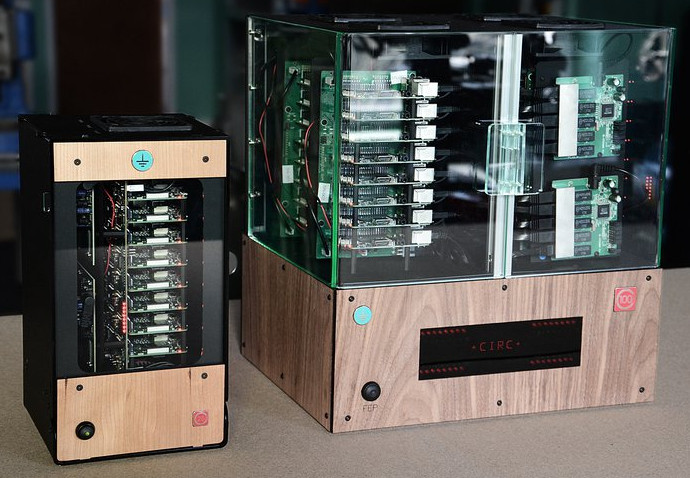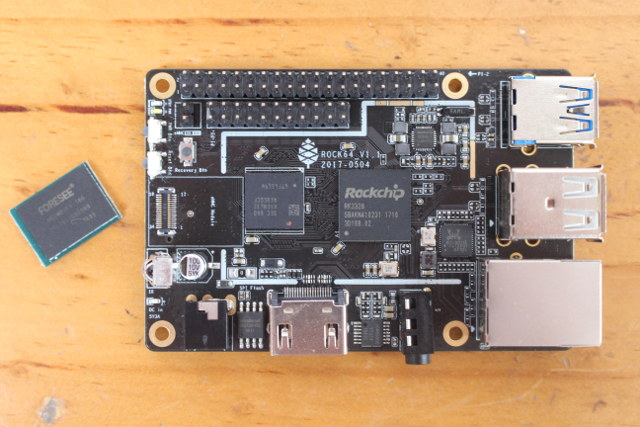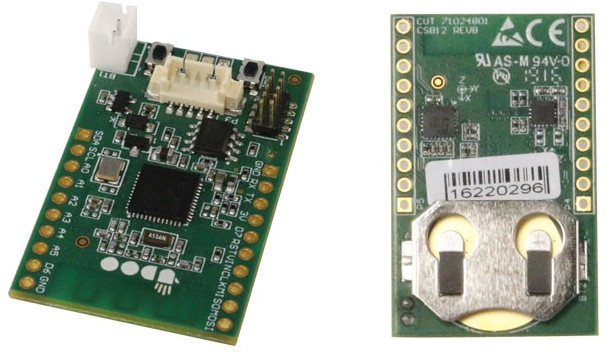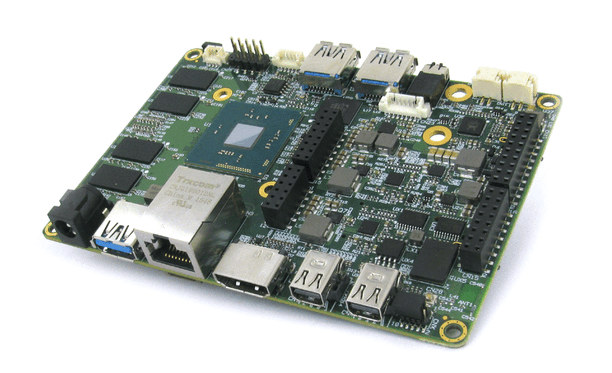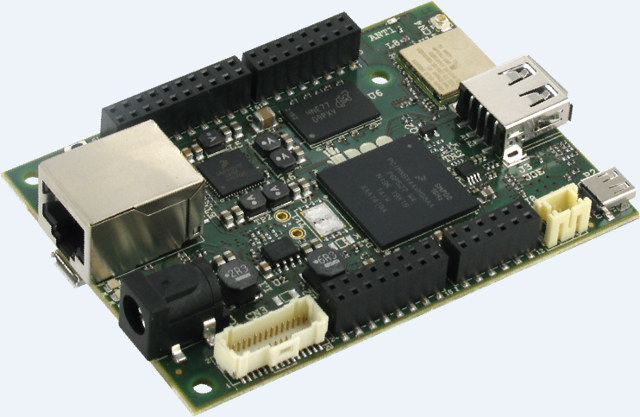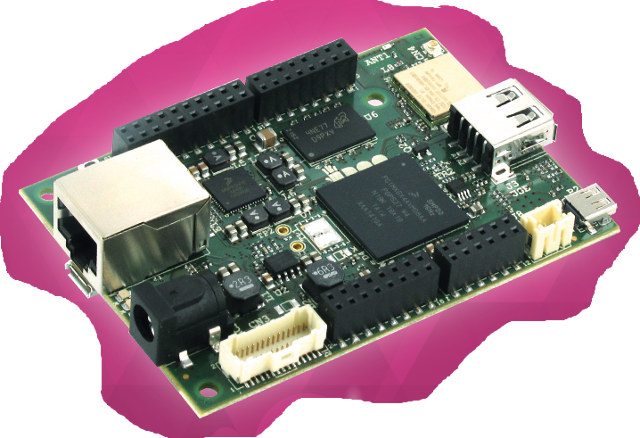We’ve previously seen several clusters made of Raspberry Pi boards with a 16 RPi Zero cluster prototype, or BitScope Blade with 40 Raspberry Pi boards. The latter now even offers solutions for up to 1,000 nodes in a 42U rack. Circumference offers an other option with either 8 or 32 Raspberry Pi 3 (B+) boards managed by UDOO x86 board acting as a dedicated front-end processor (FEP) that’s designed as a “Datacenter-in-a-Box”. Key features and specifications: Compute nodes – 8x or 32x Raspberry Pi 3 B+ boards for a total of 128x 64-bit 1.4 GHz cores max Backplane MCU – Microchip ATmega1280 8-bit AVR microcontroller Serial Comms – FTDI FT4232 quad-USB UART Switched Mode Power Supply Units (SMPSUs): 8x / 32x software controlled (one per compute node) 1x / 4x always-on (microcontroller) HW monitoring: 8x / 32x compute node energy 2x / 8x supply voltage 2x / 8x temperature Remote […]
ROCK64 and UDOO X86 Boards and Accessories are Now Available for Purchase
Pine64 ROCK64 is a development board powered by Rockchip RK3328 quad core processor, while UDOO X86 board is based on Intel Atom x5-E8000 or Celeron N3160 processor plus a Quark SE MCU. What do they have common? Not much, except both boards are now officially available for sale. Just a quick reminder of the specifications for ROCK64 board: SoC – Rockchip RK3328 quad core Cortex A53 processor with ARM Mali-450MP2 GPU System Memory – 1, 2, or 4 GB LPDDR3 Storage – eMMC flash module socket + micro SD card slot + 128 Mbit SPI flash Video & Audio Output – HDMI 2.0a up to 4K @ 60 Hz with HDR10 and HLG support, 3.5mm AV port (composite video + stereo audio) Video Codec – 4K VP9, H.265 and H.264, 1080p VC-1, MPEG-1/2/4, VP6/8 Connectivity – Gigabit Ethernet USB – 2x USB 2.0 ports, 1x USB 3.0 port Expansion Headers […]
UDOO BLU and BLU SENSE IoT Modules Integrate Bluetooth LE, Zigbee, and 6LOWPAN Connectivity
UDOO is known for their Linux boards based on NXP and Intel processors for makers and the education market such as UDOO NEO or UDOO x86, but the company has now developed UDOO BLU and BLU SENSE battery powered modules based on Texas Instruments CC2650 ARM Cortex M3 microcontroller, both with Bluetooth LE, Zigbee, and 6LOWPAN connectivity, and the SENSE model adds some extra sensors. UDOO BLU and BLU SENSE specifications: Wireless MCU – Texas Instruments CC2650 ARM Cortex M3 MCU @ 48 MHz with 128KB flash, 8KB SRAM with 2.4 GHz radio Connectivity – Bluetooth Low Energy (BLE), ZigBee, 6LoWPAN Sensors (BLU SENSE only) – NXP FX0S8700CQ accelerometer & magnetometer sensor, NXP FXAS21002C gyroscope & temperature sensor Expansion 1x 5-pin sensors Snap-In I2C connector for UDOO Bricks 2x 10-pin headers with 8x Digital GPIOs, 6x ADCs, 1x I2C, 1x SPI, 1x UART Misc – 3x User Configurable LEDs (Red, […]
UDOO x86 Development Board Combines Quad Core Intel Motherboard with Arduino 101 Board for $89 and Up (Crowdfunding)
UDOO is known for their ARM based development board with an MCU to control I/Os from Arduino compatible headers such as UDOO Quad or UDOO NEO. The community has now launched a new board called UDOO x86 powered by a quad core Intel processor, and integrating the Intel Curie compute module with Quark SE MCU used in Arduino 101, and the Arduino UNO headers. The basic version will come with Atom x5-E8000 Cherry Trail Braswell processor while the advanced version will feature Celeron N3160 Braswell processor. UDOO x86 Basic and Advanced specifications: SoC Basic – Intel Atom x5-E8000 quad core processor @ 1.04 / 2.0 GHz GHz with 12EU Intel HD graphics @ 320 MHz (5W TDP) Advanced – Intel Celeron N3160 quad-core processor @ 1.6 GHz / 2.24 GHz (Turbo) with 12EU Intel HD graphics@ 320 MHz/640Mhz (4W SDP / 6W TDP) System Memory Basic – 2 GB DDR3L […]
UDOO Neo Combines Arduino, Raspberry Pi, Wi-Fi, Bluetooth and Sensors into a Single $49 Board (Crowdfunding)
UDOO Neo was unveiled last February as the first hobbyist board features Freecale i.MX6 Solox Cortex A9 + Cortex M4 processor. I was expecting UDOO to design support board since their earlier UDOO board combined Freescale i.MX6 processor with an Atmel MCU, and the new processor allowed for integrating the same functionality into a single chip. The board is now on Kickstarter where you can pick UDOO Neo Basic for $49 (Early bird is $35), or UDOO Neo for $59 (Early bird was $45) adding an Ethernet port, some sensors, and 1GB RAM, instead of 512 MB for the Basic version. But both versions of the board basically share the same specifications: SoC – Freescale i.MX 6SoloX ARM Cortex-A9 core @ 1GHz with 2D/3D GPU and ARM Cortex-M4 Core @ 166 MHz System Memory – 512MB (Basic) or 1GB DDR3 Storage – micro SD slot, 8-bit SDIO interface (on expansion headers) […]
UDOO Neo Development Board is Powered by Freescale i.MX 6SoloX Processor
UDOO boards combine a Freescale i.MX6 dual or quad core processor with an external Atmel SAM3X MCU that’s programmable as an Arduino board, so as Freescale has now formally announced their i.MX 6SoloX processor with a Cortex A9 core running Linux and Android, and a Cortex M4 core running MQX real-time operating systems, it was logical that the company would soon launch a low cost development board based on this heterogeneous processor. Meet UDOO Neo. UDOO Neo board specifications: SoC – Freescale i.MX 6SoloX ARM Cortex-A9 core @ 1GHz and ARM Cortex-M4 Core with 2D/3D GPU System Memory – 512MB or 1GB DDR3 (only Plus version) Storage – On-board NOR SPI Flash, micro SD slot, 8-bit SDIO interface (on headers) Video Input/Output micro HDMI port LVDS interface + touch (I2C signals) Analog camera connection supporting NTSC and PAL 8-bit Parallel camera interface (on headers) Audio – HDMI USB – 1x […]
Snappy Ubuntu Core is an IoT Linux Distribution for ARM and x86
Canonical has announced a version of Ubuntu specifically designed for IoT devices running Linux, with a low hardware requirements, and a new package manager called snappy, replacing apt-get for this version of Ubuntu, which provides simpler, faster, and more reliable updates, stronger security, and allows roll-backs in case something goes wrong. Easy firmware updates are something missing in most connected device, which means they are more vulnerable to potential hackers, but with snappy security updates should be able to make it regularly, so that if something like heartbleed occurs again, you know your router, home automation gateway, connected washing machine, or robot will be soon patched automatically. Let’s go through the hardware requirements first: Processor – 600 MHz processor (ARMv7 or greater, or x86) System Memory – 128 MB RAM or greater (The system itself uses 40 MB RAM) Storage – 4GB flash / storage for factory reset and system […]
Crowdfunding Report 2013 on CNXSoft Blog
Crowdfunding has really took off in 2013, with sites like Kickstarter and Indiegogo, as they enable start-ups to launch new and innovative products, and some established, even large companies, I’m thinking Canonical with Ubuntu Edge here, have also tapped into that market, actually shifting part of the risks from shareholders, to customers / individual funders. In this post, I’ll go through all the crowdfunding projects, 16 Indiegogo and 25 Kickstarter campaigns, featured on cnx-software.com between the beginning of December 2012 till the end of November 2013, to find out which ones have been a stellar success in terms of funding and on-time delivery, and those that have failed in one way or another, with some being close to looking like scams. There was a wide range of products with dealing home automation, the Internet of things, wireless Arduino compatible boards, Linux development boards, media players and more. Let’s go straight […]


